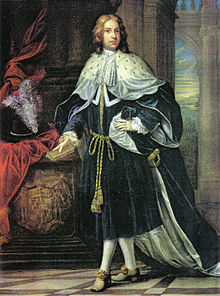Benedict Calvert, 4th Baron Baltimore
| The Right Honourable The Lord Baltimore |
|
|---|---|

Benedict Calvert, 4th Baron Baltimore
|
|
| Governor of Maryland | |
|
In office 1684–1688 |
|
| Preceded by | Charles Calvert, 3rd Baron Baltimore |
| Succeeded by | William Joseph |
| Personal details | |
| Born | March 21, 1679 England |
| Died | April 16, 1715 (aged 36) England |
| Spouse(s) | Charlotte Lee, Lady Baltimore |
| Relations |
Charles Calvert, 3rd Baron Baltimore (father) Cecil Calvert, 2nd Baron Baltimore(grandfather) Charles Calvert, 5th Baron Baltimore (son) |
| Occupation | Politician |
| Religion | Roman Catholic, converted to Anglicanism |
Benedict Leonard Calvert, 4th Baron Baltimore (21 March 1679 – 16 April 1715) was an English nobleman and politician. He was the second son of Charles Calvert, 3rd Baron Baltimore (1637–1715) by Jane Lowe, and became his father's heir upon the death of his elder brother Cecil in 1681. The 3rd Lord Baltimore was a devout Roman Catholic, and had lost his title to the Province of Maryland shortly after the events of the Glorious Revolution in 1688, which saw the Protestant monarchs William and Mary accede to the British throne. Benedict Calvert would make strenuous attempts to have his family's title to Maryland restored by renouncing Roman Catholicism and joining the Church of England.
In February 1715 Benedict became the 4th Baron Baltimore upon the death of his father, and he immediately petitioned King George I for the restoration of Maryland to his control. However, before the King could rule on the petition, Baltimore died aged 36, outliving his father by just two months. Shortly afterwards the King restored the title to Maryland to Calvert's young son Charles Calvert, 5th Baron Baltimore.
Benedict Leonard Calvert served as Governor of Maryland on behalf of his father from 1684 to 1688. Since he was just 5 years old at the time, this appointment was a purely honorary one, with the real work of governorship being carried out by his deputy, Henry Darnall.
Like his father, Benedict Leonard Calvert's Catholicism would cause him political difficulties. While still a boy he served as a cavalry officer in the regiment of James Cecil, 4th Earl of Salisbury; Salisbury was appointed a Gentleman of the Bedchamber to the Catholic King James II in 1688 and he duly converted to Roman Catholicism and served the king as Colonel of a regiment of horse.
...
Wikipedia
